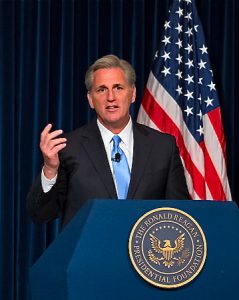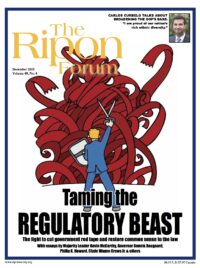
When Republicans talk about regulations, we usually focus on the economics. Regulations drag down our economy. They make hiring new employees more expensive. They increase the costs of goods and services for consumers. Reducing the burden of regulations would undoubtedly spur economic growth and improve the job market. However, that is not the only reason Republicans want to cut regulations and reform the regulatory state.
Long-term reform of how America handles and reviews regulations would not only help our economy, but has the potential to reduce government corruption and restore a constitutional system that returns ultimate power to the American people.
But we must first understand how and why regulation has become so harmful.
When our Founders drafted the Constitution, they recognized that the federal government couldn’t be trusted with unrestrained power. That’s what led to the creation of checks and balances, as well as regular elections, which allow the people or Congress to remove government officials who aren’t doing their jobs and protect the people from oppressive government.
Fixing the administrative state and reducing the broken regulatory system in America is about much more than economics. It is about holding government accountable…
Over our history, we’ve seen just how important these checks on power are. When President Franklin D. Roosevelt tried to pack the Supreme Court by adding additional justices who favored his theories of constitutionalism, the legislative branch blocked him and the people punished his overreach at the next midterm election. Likewise, if a congressman isn’t listening to his constituents or is misusing his power, the next election is only a short time away.
But in the Executive Branch where regulations are written and enacted, the reality is much more different. When the administrative state was first created in the 20th century, people thought that removing political oversight or the threat of firing would free regulators to act with complete neutrality. That would allow decisions to be based not on what the people or even elected officials want, but rather on what the “expert” regulators decide is in the people’s best interest.
The results of this have been disastrous. Rather than acting as enlightened despots in Washington (something freedom-loving people don’t want anyway), regulators are still imperfect people who can be corrupted like anyone else entrusted with power and without accountability. They also have a history of favoring interest groups over the common good, using the regulatory process to get around democracy when their policies are too unpopular to win at the ballot box.
Because of that, we have a series of regulations with the force of law that few read, fewer understand, and most don’t even want in the first place.
A prime example is the President’s clean power plan. This rule, if implemented, would damage businesses, drag down our economy, and hurt workers. But beyond these harmful effects, a Democrat-controlled Congress rejected largely the same policies just a few short years ago.
Ultimately, entrenched regulators in Washington don’t actually reflect what the people are concerned about because their decision-making process does not have to be transparent and the regulators themselves are unelected, unaccountable, and can’t easily be fired.
Add to that the various cases of fraud and mismanagement within the executive branch that never get answered for — the hack of the personal data of millions Americans at the Office of Personal Management, the lack of firing VA bosses even after a terrible scandal, and the EPA employee who watched pornography for hours a day at work but couldn’t be fired, to name a few — and what we have is a system that is prone to corruption and is an affront to the very idea of self-rule.
So fixing the administrative state and reducing the broken regulatory system in America is about much more than economics. It is about holding government accountable, putting a stop to corruptive influences in Washington, and ending the proliferation of bad rules.
Republicans in Congress have a strategy that is simple but will have profound effects: We must rein in the power of regulators and put that power back in the hands of Congress.
Though the system is deeply entrenched and will take consistent effort and courage to reform, Republicans in Congress have a strategy that is simple but will have profound effects: We must rein in the power of regulators and put that power back in the hands of Congress.
That means laws that affect the people should be written by representatives elected by the people who must continually listen and react to what the people are asking for. When the buck stops with Congress, the people always have the ultimate authority.
House Republicans have already started the work of reforming this system by passing the REINS Act, which requires Congress to actively approve any rule with a large economic impact. This is a first step in making sure Congress, not the bureaucracy, passes laws and is held accountable for those laws.
When we stop the power of bureaucrats to act as legislators, America will not only be economically stronger. We will have restored government of, by, and for the people that has made America so uniquely great in this world.
Kevin McCarthy represents the 23rd Congressional District of California. He serves as Majority Leader of the U.S. House of Representatives.




